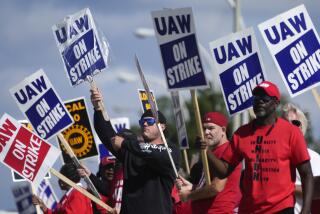‘Outrage’ isn’t the half of it
- Share via
President Obama and his administration have made a complete shambles of the AIG bailout, and the failure won’t be papered over by the chief executive’s populist campaign rhetoric.
To call it an “outrage” doesn’t begin to describe the disgraced insurance giant’s payment of $165 million in bonuses to securities traders in the very division whose dealings in so-called credit default swaps was at the root of Wall Street’s current meltdown.
All this for the guys who pushed over the first boulder in the current financial avalanche. And for what? So that American International Group Inc. can “unwind” its disastrous investments. It’s a bit like a bank robber insisting he’s entitled to a finder’s fee for telling you where he buried the loot.
Meanwhile, the New York Times reported Tuesday that Goldman Sachs Group Inc. is using millions in federal bailout money to make loans to its employees whose stakes in the firm’s internal investment partnerships have been undermined by the collapse of the real estate and equities markets.
In its own way, what’s happening at Goldman is every bit as appalling as the AIG debacle. Has anyone offered you government funds to shore up the losses in your 401(k) or retirement portfolio? It’s a ludicrous double standard that reflects the ethical sinkhole Wall Street has made of its relationship with the rest of American society.
AIG insists (and the Obama administration can’t seem to make up its mind whether it agrees) that the company is “contractually obligated” to follow through with the bonuses. The last time the right of contract was draped in as much sanctimony was when lawyers representing the robber barons of our first Gilded Age argued that the inviolability of contracts precluded the adoption of child labor laws.
Think back for a second to the beginnings of the financial crisis last year. When the auto companies went to the Bush administration asking for help, the first conditions imposed on them were executive pay cuts and renegotiation of their union contracts to bring down labor costs. The United Auto Workers went along because it wanted to save the firms and the jobs of the workers they employ.
What we’re essentially being asked to believe is that employment contracts involving hardworking men and women on Detroit’s assembly lines are somehow less legally binding -- less “sacred” in the current rhetorical argot -- than those protecting a bunch of cowboy securities traders living in Connecticut. When Larry Summers, Obama’s chief economic advisor, piously tells us that the administration’s hands are tied because we all must abide “by the rule of law,” perhaps it’s time to ask: What rule and for whom?
For years, the smart guys on Wall Street have convinced a growing number of Americans that organized labor is an impediment to economic progress, an unacceptable “cost” in a globalized system of production, a quaint social fossil from the era of mills and smokestacks. If there’s a lesson to be gleaned from the current crisis, however, it’s that when the chips are down, organized labor is a far more responsible social actor than the snatch-and-run characters who fancy themselves financiers.
The implications of this are wider than most of us imagine, and they deserve to be considered. Today, slightly less than 8% of all American workers belong to a union. Half a century ago, when more than one in three American workers were unionized, the middle class was growing -- not simply because organized labor won better wages and benefits for its members but because the presence of a vigorous labor movement pulled everybody else’s compensation up as well.
As union membership dropped, middle-class incomes -- and average families’ share of the nation’s wealth -- stagnated and then fell. Families compensated for their reduced opportunity at first by sending both parents into the workplace, then by working more hours and, more recently, by simply going deeper and deeper into debt. At the same time, the incomes and share of the national wealth held by people like the AIG securities traders grew exponentially.
The Employee Free Choice Act, currently pending in both houses of Congress, would give unions the tools they need to reorganize a reasonable share of the American workplace. Whatever the howls of opposition from Wall Street’s mandarins and their lackeys, the House and Senate ought to pass the bill and Obama ought to sign it as quickly as possible. We may have to swallow the outrage and injustice of AIG’s and Goldman Sachs’ venality and social irresponsibility for the moment, but we ought to spare our children that bitter taste.
--
More to Read
Inside the business of entertainment
The Wide Shot brings you news, analysis and insights on everything from streaming wars to production — and what it all means for the future.
You may occasionally receive promotional content from the Los Angeles Times.










